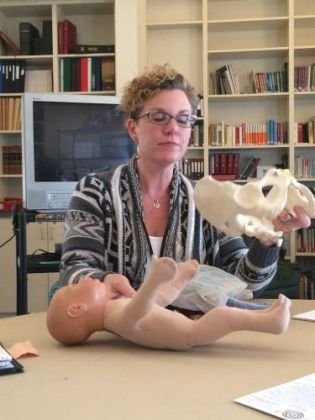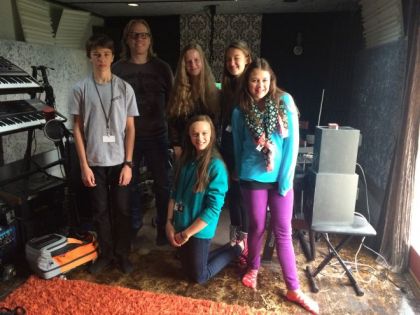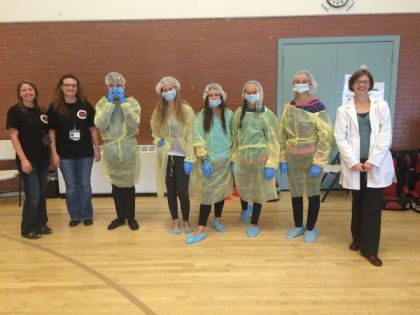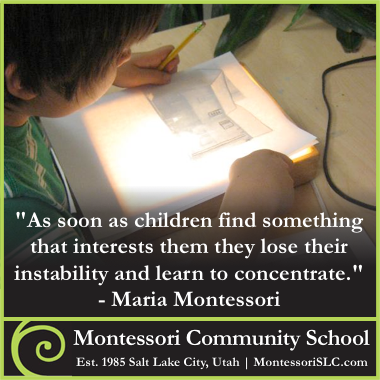Middle School Career Investigations Immersion, November 10-14
The MCS Middle School’s second cycle (6-week period) of the year focused on “Changes,” in literature, in the natural and physical world around us (fungi, protists, and matter), and how we can be catalysts for positive change in society. The immersion week offers students an opportunity to apply and integrate what they have learned throughout the previous five weeks. For Cycle 2 the immersion was a Career Investigations week. Leading up to the immersion, students utilized expository writing methods to research possible careers. During the immersion week, they investigated different professions through interviews, field trips and job shadowing.

The first professional to visit was a local paramedic and firefighter. He brought his fire gear along, which weighed about 30 pounds, not including an oxygen tank. Nearly everyone in the class took the opportunity to try it on. He also brought his medical supplies and allowed the students to experience the powerful smell of ammonia tablets that paramedics use to rouse unconscious people. He told the class the process for becoming a firefighter, which involves a written test and then a physical one. The physical test includes being able to hold 100 pounds and run a large number of stairs. Firefighters typically work 48-hour shifts (they’re able to sleep if there isn’t an emergency) and then they have four days off. Robert explained that the pay for a firefighter is about $42,000, and a fire captain makes about $82,000. A paramedic can make about $60,000. The pay goes up for all of these jobs the more relevant degrees one has.
A local documentary filmmaker showed the students trailers for four of her films. She was a social worker for about twenty years and then went to film school at the University of Utah because she felt that filmmaking would allow her to have a greater impact on society. She finds documentaries to be fascinating and a good way to learn. She explained that being an independent filmmaker allowed her to have a flexible (though busy) schedule. She has to do fundraising for her films on her own, which is typically very time-consuming. She said that her salary varies over time since she has her own business.
The students also heard from a Basic Life Skills (BLS) instructor and midwife’s assistant (she’s training to become a midwife). She teaches birth classes, and she assists with births at The Birth Center in Salt Lake City. She explained that midwives are trained to be able to do numerous medical procedures as needed, including monitoring a mother’s and baby’s vital signs, giving Pitocin if a mother is losing too much blood after a delivery, and giving stitches as needed. She showed the class a movie about unmedicated births and explained the differences between a doula and a midwife (a doula provides emotional support during labor but does not do medical procedures). Adrianna has assisted with more than 200 births.

On Thursday, November 13th, the class visited the music studio of John Hancock, MCS parent and a local songwriter. He showed the students his equipment and explained that he is hired by companies to create songs for commercials as well as to remix existing music. Companies usually pay songwriters between $300 and $1,000 in advance to create a demo song and then between $3,000 and $5,000 if they use the song. John explained that songwriters also receive royalties on songs they write that are subsequently used.

The next day, Dr. Mary Dickerson, MCS parent and a veterinarian, visited the students along with two of her coworkers. She works in Laboratory Animal Science in the Office of Comparative Medicine at the University of Utah. She takes care of the animals in the lab where she works. She explained that a veterinarian can make between $50,000 and $175,000. She brought scrubs for the students to keep and had them do a relay race to see how quickly they could put the scrubs on.

An anesthesiologist visited the same day. He explained that his job is basically to keep people from dying and to keep them comfortable. He uses morphine, local anesthetic, and sometimes laughing gas in his work. He gives epidurals as needed to mothers in labor. He typically works 65 hours a week but sets his own schedule, and he said that anesthesiologists makes between $250,000 and $700,000 depending on the year. He explained that he went to school in the United Kingdom and that the structure there involves going straight to medical school immediately after completion of high school.
The final professional to visit was MCS parent Chris Fischer, who has been a helicopter pilot since 2008. He said that helicopter pilots make an average of $40,000 per year. His most common assignment is giving tours of the Grand Canyon, and he works either seven days on then seven days off, or else 14 days on and 14 days off.
The Middle School class was excited to learn about so many different professions and was grateful to all of the professionals who shared their time and knowledge with the class.
By Carla Moquin, Middle School and Lower Elementary parent






